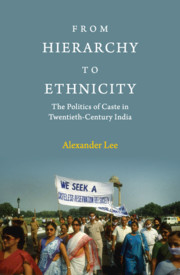Book contents
- Frontmatter
- Dedication
- Contents
- List of Tables
- List of Figures
- Acknowledgements
- 1 Introduction
- 2 Explaining Identity Activism
- 3 Caste in Historical Context
- 4 Caste in the Census of India
- 5 The Causes of Ranked Rhetoric
- 6 Caste since Independence
- 7 Conclusion
- Appendix A Data
- Appendix B Statisical Tests
- Appendix C Additional Tables and Figures
- Bibliography
- Index
2 - Explaining Identity Activism
Published online by Cambridge University Press: 14 January 2020
- Frontmatter
- Dedication
- Contents
- List of Tables
- List of Figures
- Acknowledgements
- 1 Introduction
- 2 Explaining Identity Activism
- 3 Caste in Historical Context
- 4 Caste in the Census of India
- 5 The Causes of Ranked Rhetoric
- 6 Caste since Independence
- 7 Conclusion
- Appendix A Data
- Appendix B Statisical Tests
- Appendix C Additional Tables and Figures
- Bibliography
- Index
Summary
What explains variation in the articulation of social identities? Why do people with many other potential uses of their time, spend it forming ethnic organizations, formulating elaborate theories of who is and is not a coethnic, and writing pseudo-scholarly histories of their group and its glorious past? Moreover, why do these organizations, theories, and histories differ so much from each other?
This set of questions can be thought of as presenting two problems: First, do individuals engage in identity activism (rather than non-political activities or types of political involvement that do not engage with a specific identity)? Second, what form does it take? In particular, is it ranked or unranked?
This chapter suggests solutions for both these problems. It proposes that, consistent with the existing political behaviour literature, the predictors of activism are economic: the existence of an educated class capable of political involvement and the opportunity cost of non-identity activism. The predictors of ranked activism, by contrast, are political: the type of state institutions in place, and the interactions of those institutions with the attributes of groups.
The chapter begins with discussions of two key concepts: identity activism and social ranking. It then discusses why rational individuals might choose to use these concepts for their own advancement, and what factors would keep them from doing so.
What is identity activism?
Activism as attempted mobilization
A large literature in comparative politics has argued that individuals possess a wide ‘repertoire’ of traits, the exact content of which varies from society to society (Laitin 1985; Posner 2004; Chandra 2012). Common categories of traits include skin color, occupation, religion, language, tribe, and region of residence. At any given time, only a few of an individual's traits are ‘relevant’ or ‘activated’ for the purposes of political decision-making. These are the traits that individuals consider as important when making decisions about who to vote for, whether to engage in political violence, and whether to enter into patron–client relationships. In India, for instance, caste, religion, and language identities have all been strongly politicized, while skin colour remains politically (though not socially) unimportant.
Individuals, to say the least, receive a great deal of advice from outside political actors about which of these identities they should use in their political decision-making.
- Type
- Chapter
- Information
- From Hierarchy to EthnicityThe Politics of Caste in Twentieth-Century India, pp. 29 - 55Publisher: Cambridge University PressPrint publication year: 2020



